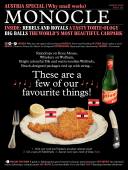
Issue 131
Why Austria? This smallish landlocked central European nation is quietly offering global lessons in everything from diplomacy to design (not to mention around the dining table). Our dedicated special takes an in-depth looking into everything from its Alpine attractions to entrepreneurial clout and hands-on craft culture. Our journalists unlock everything from how the Habsburg’s changed history to hospitality and fresh lessons for the rest of the world.
In This Issue
Oops! No content was found.
Looks like we no longer have content for the page you're on. Perhaps try a search?
Return Home

